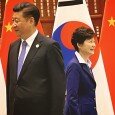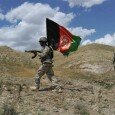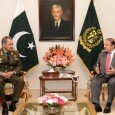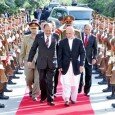Lt.-Gen (R) Talat Masood:
Both Washington and Islamabad need to do more to recast their troubled relations as a new civilian government in Pakistan takes to power
In the aftermath of the Pakistani elections and Nawaz Sharif’s government in place with a comfortable majority, U.S. and Pakistan should be looking forward to working closely at a time when both need each other in their own national interest. The visit of U.S. secretary of State John Kerry to Pakistan, although delayed for a while due to the Syrian crisis, could set the tone and substance for a new beginning.
For Washington, Pakistan’s present strategic utility lies in its ability to serve as a valuable partner while bulk of its forces withdraw from Afghanistan by 2014. For President Obama the most important legacy would be to ensure a peaceful exit from Afghanistan and for that Pakistan’s cooperation is crucial. If the Afghan war is out of the way, then for the remaining period of his presidency, Mr. Obama can focus on domestic issues, especially the revival of the economy and other unfinished tasks including the “Obama Care”.
In the longer term too, an enduring Pakistan-U.S. partnership is crucial for the stability of the region that neither country can ignore. Washington’s growing strategic ties with India and its interest in Central and West Asia can only be fully optimized if Pakistan remains stable and a partner.
Pakistan’s immediate interest too lies in the stability of Afghanistan. A chaotic Afghanistan would be a huge exporter of instability for Pakistan. The dreadful scenario of thousands of refugees pouring in as a result of a civil war would be an unbearable burden for Pakistan’s fragile economy and social structure. In fact, all neighboring countries of Afghanistan, including Iran, China and Russia are equally concerned about its stability. However, there could be differences between them as to how this goal can be achieved.
Pakistan has been building pressure on the Afghan Taliban leadership to engage in the negotiating process and its efforts have partly succeeded. The Taliban has already opened its office in Doha and if the negotiating process with the Americans moves forward it would be a major breakthrough. The attitude of President Karzai is unpredictable. Despite American assurances, he feels isolated and has been threatening to disown peace talks with the Taliban.
If the mistrust between Karzai government and Islamabad continues due to divergent perceptions of security, Pakistan would need the support of the U.S. to act as an interlocutor between them. We cannot afford to face at this critical period of withdrawal in Afghanistan to be on different side of U.S. (and India).
In a major departure from the past, Pakistan’s military and civil leadership is now supportive of power sharing in Afghanistan between all groups including Taliban. It has been reaching out to the Northern Alliance and other centers of power in Afghanistan. This policy change seems to be going through an evolutionary phase and is helpful in bringing greater policy convergence between the U.S. and Pakistan during the critical end game.
As of now on an average 60% of U.S. and NATO logistic supplies to and from Afghanistan depend on Pakistan for safe transit. Any major hold up for security or other reasons could become problematic for the two countries. Similarly, close cooperation at the operational level and better intelligence sharing between the two militaries are also imperatives of the day.
The fundamental challenge for the new government however would be whether it is able to transform Pakistan from a rent seeking to a less dependent but cooperative relationship with U.S. On the other hand, whether America is prepared to invest in a long-term partnership that goes beyond the transactional interest in fighting militancy. The Kerry-Lugar bill was an effort in that direction but did not have much resonance. What is needed is to develop mutual interests in which Pakistan gains more by trade and economic assistance and Washington finds a stable and dependable ally in Pakistan.
Bracketing Afghanistan and Pakistan together into a single theatre of operations and labeling it as Af- Pak may have been convenient for Washington’s strategy on the “war on terror” but is justifiably resented in Pakistan. The sooner it is de-hyphenated from it the better for our relations, as it fails to recognize Pakistani priorities. Clearly, a long and seamless border and common ethnicity and religious and tribal bonds was probably the primary reason for conflating the two countries.
Nonetheless, Pakistan’s new government would like Washington to deal with it in its own right as a country of 180 million people, a nuclear power and strategically well located. More importantly, the entire focus on operational aspects of the Western border hides the reality of Pakistan’s other security concern with respect to India and resolution of core issue of Kashmir. A positive relationship of Pakistan with the future government in Afghanistan is also critical for the stability of the region. U.S. will be supportive of improvement in India-Pakistan relations and encourage dialogue between various political factions within Jammu & Kashmir, but will stay away from putting any pressure on India to settle the core issues. It may engage in crisis management if tensions escalate.
The use of drones on Pakistan’s territory is another major irritant in Pak-U.S. relations and is not likely to go away that soon. How will Obama’s administration address the new leadership’s sensitivities in this regard and will Pakistan be able to satisfy U.S. security concerns that have led to the use of drones in the first place. The U.S. rationale for the unilateral use of drones is that Pakistan does not exercise control over large areas in North Waziristan and few other parts of the tribal region. Afghan Taliban and other militant groups are using these sanctuaries for launching attacks on U.S. and ISAF. Pakistan’s sovereignty is already compromised, as writ of the state does not apply in these areas. Moreover, General Musharraf had given approval on the use of drones, while denying it in public. The previous civilian government apart from making noises pursued the same policy.
The situation is now very different as PML (N) and Pakistan Tehreek-e-Insaf (PTI) have taken a strong stand against drone strikes and find it difficult to back off without losing face. U.S. government, by authorizing the use of drones, is violating international law or at the minimum operating in a grey zone of accepted international legal norms. Any tactical advantage that drone strikes offer has to be weighed against its serious negative political fallout.
Ideally, if the U.S. and Pakistan were to share intelligence then the use of drones could be a joint operation. That level of trust does not exist at least as of now.
The public perception of each other’s others country is very negative and both the Pakistani and U.S. governments have made no effort at improving it. No healthy relations can be established at the government level when the people of the countries view each other as adversaries.
In U.S. there has to be a more realistic appreciation of the limits to what Pakistan can do in Afghanistan and in the tribal belt. Inflated expectations especially by U.S. Congress have only increased mistrust. Pakistan’s expectations from the U.S. also need to be dampened in terms of economic and military assistance. Too much reliance leads to a client-patron relationship.
U.S. and Pakistan need to take concrete measures to build trust in form of expanding the bilateral trade. Washington should continue its support in the education, health and energy sectors. The militaries should cooperate at the operational and intelligence level especially in managing the border between Afghanistan and Pakistan.
A constructive vision of U.S.- Pakistan relations, based on mutual trust and respect could be a good beginning for the new government.
The writer is a retired Lt. General and a prominent commentator on issues related to politics and defence.































































































